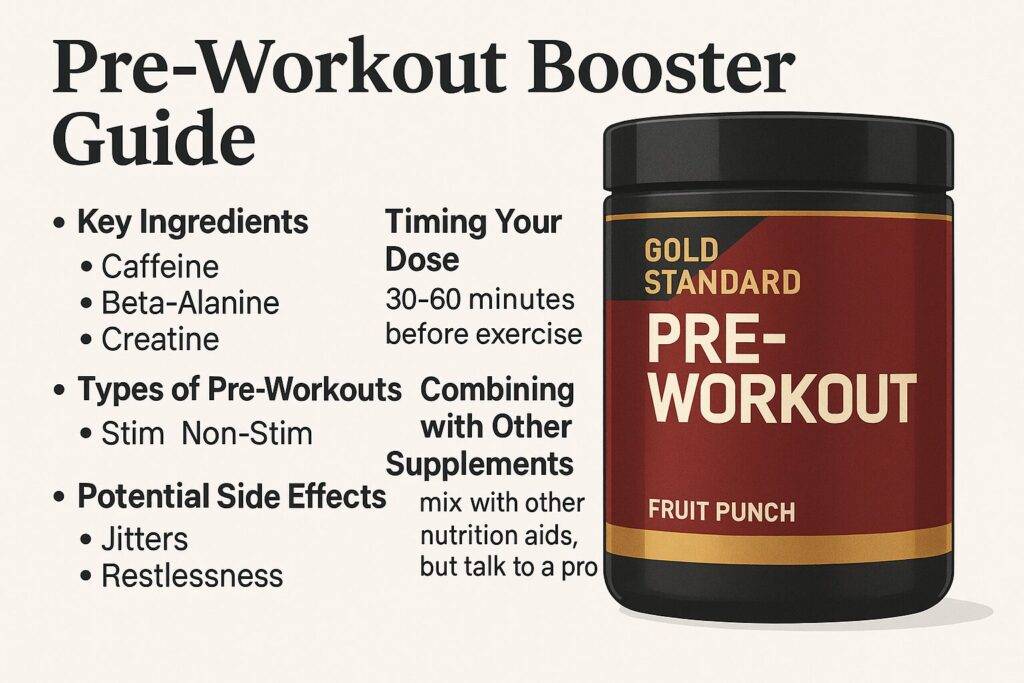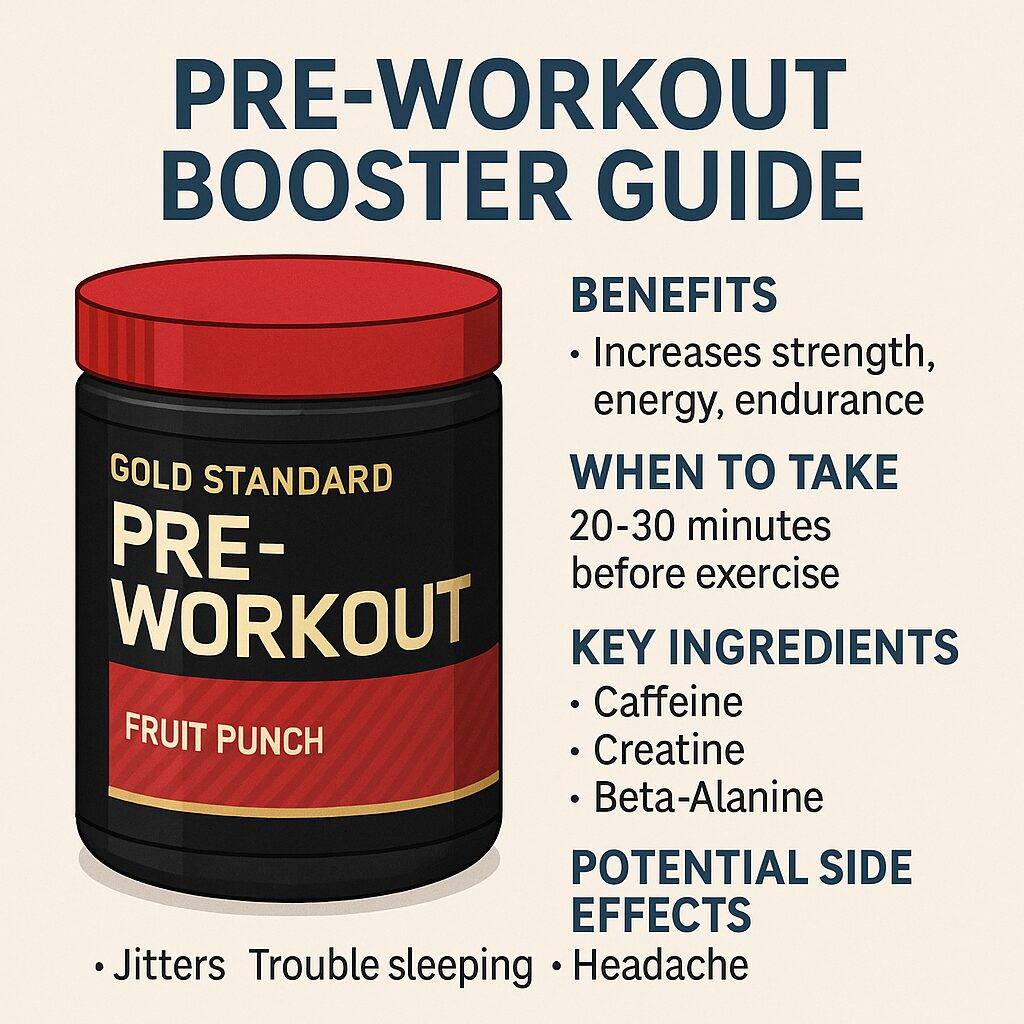Table of Contents
Toggle1. What Is a Pre-Workout Booster?
This pre-workout booster guide gives you everything you need to know about using pre-workout supplements for strength training. These supplements are designed to enhance your physical abilities by increasing energy, focus, and blood flow. They are especially popular among strength trainers, bodybuilders, and high-intensity athletes.
Pre-workouts come in various forms—powder, capsules, or ready-to-drink shots. They are typically taken 20 to 30 minutes before a workout session to give your body the fuel it needs to train harder and last longer. You can explore more options in our Pre-Workout Booster Collection.

2. Key Benefits for Strength Training
Here are the main advantages of using supplements as described in this pre-workout booster guide for strength training. Not only do they increase energy, but they also help improve overall performance in multiple ways:
- Increased Energy: Caffeine and similar stimulants help reduce fatigue and increase stamina.
- Enhanced Focus: Ingredients like tyrosine and taurine improve concentration during intense sets.
- Muscle Endurance: Beta-alanine buffers lactic acid, helping you push through more reps.
- Improved Blood Flow: Nitric oxide boosters like citrulline increase muscle pumps and nutrient delivery.
- Strength Output: Creatine and other compounds may help improve maximum lift performance.
Read more from Healthline – Pre-Workout Supplements.
3. Common Ingredients & Their Effects
Understanding the label is crucial when choosing a supplement, and this pre-workout booster guide will help you recognize what matters. Furthermore, each component serves a specific function to support your workout goals. Here’s a breakdown of key ingredients:
- Caffeine: Boosts alertness and performance; dosages vary from 100–300mg per serving.
- Beta-Alanine: Helps reduce muscle fatigue and improves endurance during high-rep sets.
- L-Citrulline: Promotes blood flow, better pumps, and muscle fullness.
- Creatine Monohydrate: A well-researched compound that supports ATP regeneration and muscle strength.
- Tyrosine: Supports brain function and stress management under heavy training loads.
4. How to Use Pre-Workout Boosters Effectively
To get the best results from your pre-workout supplement, follow these steps provided by this pre-workout booster guide. Additionally, make sure to listen to your body and adjust based on your sensitivity:
- Take it 20–30 minutes before your workout.
- Start with half a dose if you’re new or caffeine-sensitive.
- Avoid consuming additional caffeine sources (like coffee or energy drinks).
- Stay hydrated—pre-workouts can increase water loss through sweat.
- Cycle usage: take a break after 6–8 weeks to reset caffeine tolerance.
Recommended products:
5. Who Should or Shouldn’t Use Pre-Workout?
Pre-workout boosters are not for everyone. For instance, people with heart issues may want to avoid them. Here’s a quick guide:
Great for:
- Strength athletes and bodybuilders
- High-intensity interval training (HIIT) participants
- Those training early in the morning or after a long workday
Use with caution or avoid if you:
- Have heart conditions or hypertension
- Are pregnant or breastfeeding
- Are sensitive to stimulants
6. Side Effects and Safety Tips
Some users may experience side effects. Therefore, it is best to be informed and proceed with caution:
- Jitters or anxiety (especially with high caffeine doses)
- Insomnia if taken too late in the day
- Tingling sensation from beta-alanine (harmless but noticeable)
- Digestive issues if taken on an empty stomach
Always check with a healthcare professional if you’re unsure about starting a new supplement.
7. Pre-Workout vs. Other Supplements
How does pre-workout compare to other fitness supplements? Let’s break it down:
- Protein Powder: Supports muscle recovery but doesn’t affect energy before training.
- Creatine: Often included in pre-workouts, but can also be taken daily on its own.
- Electrolyte Drinks: Useful for hydration but lack performance-enhancing effects.
Pre-workout is best used in combination with a good diet and proper recovery plan.
8. FAQs
8.1 When is the best time to take pre-workout?
20–30 minutes before your workout for optimal absorption and effect.
8.2 Can I use pre-workout every day?
You can, but it’s wise to cycle it and avoid overuse of stimulants.
8.3 Is pre-workout safe for beginners?
Yes, but start with a low dose and choose a low-stim or stim-free option.
9. Conclusion: Should You Use Pre-Workout Boosters?
In conclusion, if you’re aiming to maximize your strength, focus, and endurance in the gym, a well-formulated pre-workout can be a valuable addition to your supplement stack. Just make sure to understand the ingredients, time your intake wisely, and monitor how your body responds.
Explore more options in our full Pre-Workout Booster Collection today.
🔗 Related Guides
- Adjustable vs Fixed Weights – Which Is Better for Beginners?
- Strength Training Myths That Keep Beginners From Starting
- Muscle Recovery 2025: Science-Based Essentials for Faster Results
Disclosure: As an Amazon Associate, HealthFitHub earns from qualifying purchases.

